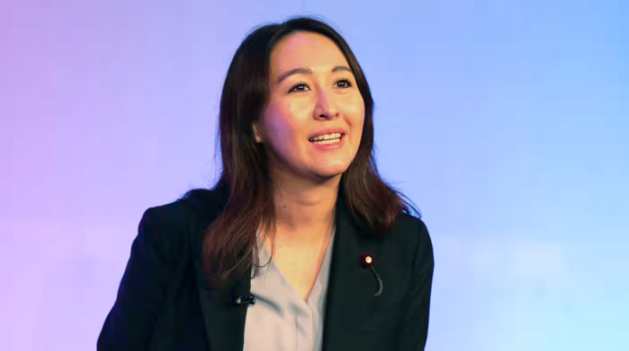Lawmaker from Uyghur-Japan demands a tougher stance against China
Japan’s first lawmaker of Uyghur heritage is urging her country to take a stronger position on China’s human rights record, while also calling for a heightened defense posture in response to Beijing’s increasing military assertiveness in the Indo-Pacific region.
Arfiya Eri, born in Japan to ethnic Uyghur and Uzbek parents, was elected to the lower house of the Japanese Diet in 2023 representing a district just outside Tokyo. Before that, she was educated partly abroad, including in China and the U.S., and worked for the Bank of Japan and the United Nations.
Eri’s emergence as a parliamentarian with a diverse background comes as the country grapples with demographic challenges, including a declining fertility rate and a rapidly aging population, all while maintaining strict immigration and asylum policies compared with some Western countries. She has said she wants “to show [people] at home and abroad that there are various forms of ‘Japanese.'”
In a recent interview with Nikkei Asia in Sydney, where she participated in the Sydney Dialogue hosted by the Australian Strategic Policy Institute, she pulled no punches, saying Japan must intensify its response to what she called “egregious human rights abuses” by China in the far northwestern region of Xinjiang.
She said Japan has not followed the lead of some Western nations in recognizing the situation in Xinjiang as either genocide or a crime against humanity. She also expressed disappointment over what she sees as the Japanese parliament’s tepid response.
Many countries that have economic and trade relationships with China, including Japan, find it “inconvenient … to admit they are dealing with a human rights abuser,” said Eri, a member of the ruling Liberal Democratic Party. “No other genocide ongoing in real time has had this much evidence revealed as the human rights abuse was ongoing,” she said.
The U.S. Congress and parliaments in the U.K., Canada, Lithuania, the Netherlands and France have passed motions declaring a genocide in Xinjiang, but Japan’s legislature has stopped well short of that. The lower house, in a 2022 resolution, called on the government to “gather information in order to ascertain the full scope of this serious human rights situation” in Xinjiang and other regions of China.
In its latest diplomatic Blue Book published this year, Japan’s Foreign Ministry said the country has directly expressed “serious concern” regarding human rights in China — including Xinjiang and Hong Kong — to the Chinese government through summits and foreign minister meetings. It also said Japan joined 50 other countries in October of last year in a U.N. statement on human rights in Xinjiang. That specifically mentioned a 2022 U.N. report on Xinjiang that found China’s actions “may constitute international crimes, in particular crimes against humanity.”
China has been accused by human rights organizations and foreign governments of carrying out widespread abuses against Uyghur and other mostly Muslim groups since the implementation a decade ago of what Beijing has called an anti-terrorism campaign. Pressure was ramped up in 2017, when internment camps for mass detention were identified. China has consistently denied any abuse, with Foreign Minister Wang Yi labeling claims of genocide “absolutely absurd.”
Eri, who turns 36 next month, also took China to task over its regional security and military posture.
That has been marked by frequent air incursions over the Taiwan Strait and dangerous naval maneuvers in the South China Sea. A Chinese surveillance plane violated Japanese airspace for the first time last month, forcing Tokyo to rapidly deploy fighter jets in response.
Eri said Japan needs to be “constantly agile” to flexibly counter what she calls such “evident threats to the rules-based international order.” She argued that Japan must increase defense spending and update its “very passive constitution” to explicitly mention the role of the Self-Defense Forces, the country’s de facto military.
Japan’s national security preparedness should be bolstered to match its alertness for earthquakes and tsunami, she said. “If there is a singular risk that something might happen to our soil and our seas, we have to prepare for it.”
China’s embassy in Australia did not respond by publication time after Nikkei sought reaction to Eri’s comments.
Japan has not amended its constitution since it was enacted under U.S. military occupation in 1947, two years after World War II ended. At the heart of the document is Article 9, which renounces war and prohibits Japan from maintaining land, sea, or air forces.
In recent years, the LDP has pushed for constitutional change, including a proposal to formally recognize the SDF in the document. But moves to amend the document have divided public opinion.
“I find it a very outdated argument in our current national international security space, where we’re still debating whether we can defend ourselves should we be attacked,” she said. “This type of revision needs to be passed quickly.”
Eri said Japan, being the “strongest democratic economy in Asia,” combined with an “intimate understanding” of China due to geographical proximity and long interactions throughout history, can provide valuable insight for its Western allies.
Though Japan has a decadeslong security treaty with the U.S. and falls under the country’s so-called nuclear umbrella, it is seeking to broaden defense cooperation with other countries.
In April, the defense chiefs of AUKUS, the trilateral security agreement between Australia, the U.K. and the U.S., announced they were considering cooperation with Japan over “advanced capability projects.” In return, Japan would benefit from the knowledge base and collaboration built into the AUKUS infrastructure.
“We are at an age where global world order needs to be kept in partnerships and alliances,” Eri said. “I don’t think any single country in the democratic space can confidently say that it can protect itself in a time of threats and war.”













